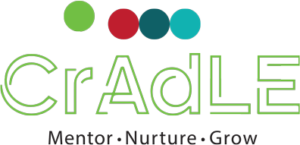Industry Focused Area
We are a Technology Business Incubator with Manufacturing, Healthcare, Renewable Energy and Food/Agribusiness as our focus areas.
Eligibility
Admission to CrAdLE is open to any Company/Proprietorship/LLP who Working towards innovation, development, deployment or commercialization of newproducts, processes or services driven by technology or intellectual property.
Admission Process
At the opening level, applicants for admission in TBI will be required to submit the Application Form, which can be availed from the CrAdLE office or download from our website.
Based on the initial scrutiny of application and affirmative assessment, applicants will be asked to submit a detailed proposal comprising of the following documents:
- Business Plan.
- Details of IP/ technology based on which a company is proposed to be promoted/ founded.
An illustrative template for a business plan may be obtained from the CrAdLE office or may be downloaded from our website. Applicants may give such additional information as they think would help in the assessment of their proposal.
Selection Criteria
CrAdLE aims to incubate startups in the areas of Manufacturing, Renewable Energy, Healthcare and Food/Agribusiness. This initiative is in keeping with phenomena of entrepreneurship and the support being extended to startups by the Government of India and stakeholders such as CrAdLE’s promoter, Entrepreneurship Development Institute of India.
Prospective incubatees are welcome to familiarize, visit and know more about our facility, services, mentors and host of activities and initiatives that create and add value to the startup ecosystem. The chief intake criteria are listed and briefly explained below.
Innovation Proposed
The Innovation proposed is something original and more effective and, as a consequence, new, that has the potential to be a disruptive solution to a problem or set of problems/need(s) that can break into the market or society.
Proof of Concept
Proof of concept (POC) is a realization of a certain method or idea in order to demonstrate its feasibility, or a demonstration in principle with the aim of verifying that some concept or theory has practical potential. A proof of concept is usually brief and may or may not be complete.
Technical Feasibility
Technical feasibility is one of the first studies that must be conducted after a project has been identified. For a business entity a technical feasibility study includes, method of production, production technique, project requirements, project location etc.
Financial Feasibility
In case of a new project, Financial feasibility can be judged on the following parameters: Total estimated cost of the project, financing of the project in terms of its capital structure, debt to equity ratio and promoter’s share of total cost, projected cash flow and profitability
Resources Planning
Resources planning is defined as a method for the effective planning of all resources of a company. Ideally, it addresses operational planning in units, financial planning, and has a simulation capability to answer “what-if” questions.
Scalability
Scalability is the capability of a system, network, or process to handle a growing amount of work, or its potential to be enlarged in order to accommodate that growth.
Sustainability
Sustainability is the ability to be maintained at a certain rate or level of growth.
Team Composition
Team composition is the respective set of skills, expertise and qualifications that the founders/management team bring to the table.
Social Relevance
Social relevance is the quality of being connected to positive social impact or the ability to contribute positively to society/societies.


